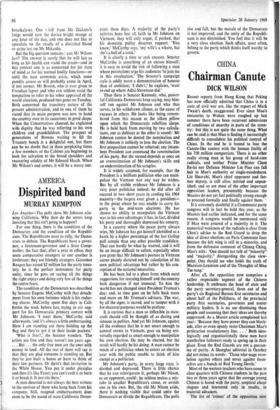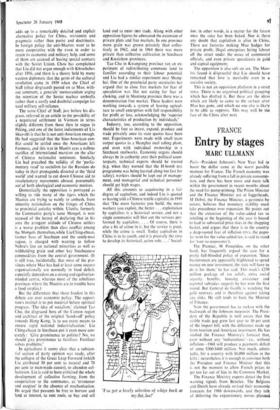Chairman Canute
CHINA DICK WILSON
Recent reports from Hong Kong that Peking has now officially admitted that China is in a state of civil war are, like the report of Mark Twain's death, exaggerated. Ever since Mao's emissaries to Wuhan were roughed up last summer there have been recurrent admissions of conditions of anarchy in parts of the coun- try: but this is not quite the same thing. What can be said is that Mao is finding it increasingly difficult to consolidate his political control of China. In the end he is bound to lose the Canute-like contest with the human frailty of his 750 million compatriots. There is no other really strong man in his group of hard-core radicals, and neither Prime Minister Chou En-lai nor Defence Minister Lin Piao can fall heir to Mao's authority or single-mindedness. Liu Shao-chi, Mao's chief opponent and for- mer deputy, is still alive, untried and unpun- ished, and so are most of the other important opposition leaders, presumably because the Maoists do not yet feel politically strong enough to proceed formally and finally against them. - It is extremely doubtful if a Communist party congress will in fact be held this year, as the Maoists had earlier indicated, and for the same reason. A congress would be summoned only if Mao were assured of a majority in it. The numerical weakness of the radicals is clear from Chou's advice to the Red Guard to drop the idea of direct elections on Paris Commune lines because the left wing is still in a minority, and from the defensive comment of Chiang Ching, Mao's wife : 'One should not talk of "minority" and "majority," disregarding the class view- point. One should see who holds the truth of Marxism-Leninism and of the Thoughts of Mao Tse-tung.'
After all, the opposition now comprises a rather respectable segment of the Chinese ' leadership. It embraces the head of state and the party secretary-general, three out of the party's six Regional Bureau first secretaries and about half of the Politburo, of the provincial party first secretaries, governors and senior military leaders. It is no use dismissing these people and assuming that their ideas are thereby suppressed. As a Maoist article complained last year: 'Because they have power they can block- ade, alter or even openly resist Chairman Mao's proletarian revolutionary line. . . .' Both ideo- logically and organisationally these men have numberless followers ready to spring up in their place. Even the Red Guards are not a guaran- tee of purity. A Shanghai editorial in October did not mince its words: 'Those who wage revo- lution against others and never against them- selves are a bunch of Red Young Devils.'
Most of the western teachers who have come to close quarters with Chinese students in the past two or three years agree that the average young Chinese is bored with the party, sceptical about slogans and interested only in results, in material advances.
The list of 'crimes' of the opposition now adds up to a remarkably detailed and explicit alternative policy for China, revisionist and pragmatic rather than purist and doctrinaire. In foreign policy the anti-Maoists want to be more cooperative with the USSR in order to retain its economic and military help, and some of them are accused of having special contacts with the Soviet Union. Chou has complained that Liu did not argue enough with Khrushchev after 1956, and there is a theory held by many western diplomats that the germ of the cultural revolution came in 1959 when the Chief of Staff (since disgraced) passed on to Mao, with- out comment, a generals' memorandum urging the retention of the Soviet nuclear umbrella rather than a costly and doubtful campaign for total military self-reliance.
The same Chief of Staff, just before his dis- grace, referred in an article to the possibility of a negotiated settlement in Vietnam in terms slightly different from those then in vogue in Peking, and one of the latest indictments of Liu Shao-chi is that he is not anti-American enough. He had suggested that the Sino-American con- flict could be settled once the Americans left Formosa, and this was in Maoist eyes a callous sacrifice of international marxism on the altar of Chinese nationalist sentiment. Similarly Liu had preached the validity of the 'parlia- mentary road' to socialism (as the Russians do today in their propaganda directed at the 'third world' and wanted to cut down Chinese aid to revolutionary . movements abroad, presumably ourof both ideological and economic motives.
Domestically the opposition is portrayed as willing to ride many of the tigers which the Maoists are trying so vainly to ambush, from minority nationalism on the fringes of China to provincial autarky within. Ulanfu, formerly the Communist party's tame Mongol, is now accused of the heresy of declaring that in his area the arrogant attitude of Chinese settlers is a worse problem than class conflict among the Mongols themselves, while Liu Ching-chuan, former boss of Szechuan and the south-west region, is charged with wanting to follow Nehru's line on national minorities as well as withholding grain and other key Szechuanese commodities from the central government. (It is stjll true, incidentally, that most of the pro- vinces where Mao has had at least some success organisationally are normally in food deficit, especially dependent on a strong and egalitarian- minded centre, whereas most of the rebellious provinces where the Maoists are in trouble have a food surplus.) But the differences that shout loudest in this debate are over economic policy. The opposi- tion's instinct is to put material before spiritual progress. 'The idea of- socialism,' claimed Tao Chu, the disgraced boss of the Canton region and architect of the original 'hands-off' policy towards Hong Kong, 'is to use every means to ensure rapid national industrialisation.' Liu Ching-chuan in Szechuan put it even more con- cretely: `Qive prominence to politics? No, we should give prominence to .fertiliser. Fertiliser solves problems.'
In agriculture it seems clear that a substan- tial section of party opinion was ready, after the collapse of the Great Leap Forward (which Liu attributed 30 per cent to natural and 70 per cent to man-made causes), to abandon col- lectivism. Liu is said to have criticised the whole development of collective farming, from the cooperatives to the communes, as 'erroneous and utopian' in the absence of mechanisation. He urged that peasants be free to borrow and lend at interest, to rent tools, to buy and sell land and to enter into trade. Along with other opposition figures he advocated the extension of private plots and free markets. In one province more grain was grown privately than collec- tively in 1962, and in 1964 there was more private than collective cultivation in Szechuan and Kweichow provinces.
Tao Chu in Kwangtung province ran an ex- periment of redistributing commune land to families according to their labour potential, and Liu had a similar experiment near Shang- hai. One of the provincial party secretaries has argued that to close free markets for fear of speculation was like not eating for fear of choking, and in Shantung province there was a demonstration free market. These leaders were working towards a system of leaving agricul- ture to small enterprises with full responsibility for profit or loss, acknowledging the 'superior characteristics of production by individuals.'
Industry, too, according to the opposition, should be free to invest, expand, produce and trade privately once its state quotas have been met. Experiments were made with small team output quotas in a Shanghai steel tubing plant, and even with individual ownership in a Szechuan steelworks. Economic organs should always be in authority over their political coun- terparts, technical experts should be trusted (e.g. when they warned that the H-bomb test programme was being hurried along too fast for safety), workers should be kept out of manage- ment, and managerial and technical personnel should get high wages.
All this amounts to acquiescing in a fair degree of capitalism, and indeed Liu is quoted as having told a Chinese textile capitalist in 1949 that 'The more factories you build, the more workers you exploit, the better. exploitation by capitalists is a historical service, and not a single communist will blot out the services per- formed by capitalists. . . . Of course, there is also a bit of crime in it, but the service is great, while the crime is small. Today capitalism in China is in its youth. and it is precisely the time to develop its historical, active role... .' Social- 'I've got a lovely selection of whips back at my fiat, luv!' ism, in other words, is a matter for the future once the cake has been baked. Nor is there any doubt that capitalism is alive in China. There are factories making Mao badges for private profit, illegal enterprises hiring labour off the street under the noses of communist officials, and even private speculators in gold and capital equipment.
The opposition is also soft on sex. The Mao- ists found it disgraceful that Liu should have remarked that love is inevitable even in a socialist society.
This is not an opposition platform in a strict sense. There is no organised political grouping which has drafted it. But these are the ideas which are likely to come to the surface alter Mao has gone, and which no one else is likely to be able to suppress. This may well be the face of the China after next.



































 Previous page
Previous page